
11 minute read
From the Chair
By Paul Schembri, Chairman CANEGROWERS
The State election is weeks away and, while it might sound clichéd, this election really does loom as one of the most critical for Queensland’s sugar industry. Good government policy helps our industry grow, which strengthens regional economies. Poor government policy is a handbrake on our industry, and regional economies suffer when we can't reach our potential.
Advertisement
CANEGROWERS has released a list of priorities for the upcoming election. Our list of issues is grounded in the fact that for every $1 spent growing sugarcane in Queensland, about $6.42 of regional economic activity is generated.
That's why our policy platform is based on the notion that we want to work in partnership with government to grow regional economies. If governments back sugar, then they will get this money back six times over.
For example, if the level of government investment in Sugar Research Australia (SRA) were doubled, the dividend to the industry and regional communities would be substantial. The current Queensland Government contribution to SRA is $2.8 million annually.
Our full election platform is outlined in a pullout election brochure that can be found at the centre of this magazine. However, I’d like to highlight the three largest pillars here.
WATER AND ELECTRICITY PRICES
The price of water and electricity must be lowered. Electricity bills paid by farmers have risen by more than 130% since 2007. Farmers and irrigators have been excluded from recent price reductions for small business and households.
High water and electricity costs discourage irrigation and constrain productivity which affects regional economies, mill viability and international competitiveness.
The blind insistence that electricity and water delivery must be achieved at zero cost to the public purse is reaping dividends for government but destroying industries and regional economies.
REEF REGULATIONS
The current reef regulations stifle innovation by cane framers and will provide little, if any, improvement in the health of the Great Barrier Reef.
Just as importantly, they fail to acknowledge the massive cultural and farming practice changes that sugarcane farmers have adopted over the decades. Farmers know when they are not getting a fair go. The first Act to bring in regulations in 2009 was meant to improve the health of the Reef, yet 10 years later a larger bureaucratic baseball bat has been introduced based on the narrative that water quality is still poor. Presumably we are meant to believe that new regulations, which force farmers to jump through ever increasing bureaucratic hoops, impinge on their privacy and hurt their productivity, will somehow improve water quality - go figure! CANEGROWERS commissioned a report based on the impact of requirements to reduce nitrogen rates by up to 30% below SIX EASY STEPS rates.
That report found that the Queensland economy (not just the sugar industry) would take a hit of $1.3 billion over 10 years if such a policy were implemented. We say repeal the 2019 reef legislation and overhaul the system that manages and scrutinises the water quality research used to justify regulations.
INDUSTRY DEVELOPMENT
Queensland's sugar industry is perhaps the most highly trade-exposed in the world. Around 98% of our production is exposed to the global price and 94% of our total revenue is dependent on sales of raw sugar. We need to change our level of exposure to volatile world sugar prices and the destructive nature of export subsidies. As cane growers, we produce around 30 million tonnes of cane, which when processed produces around 4.5 million tonnes of sugar. Obviously there remains a huge amount of biomass that can be utilised to create renewable biofuels, renewable energy by co-generation and potentially bioplastics, to name but a few.
However, we need a policy framework from government (or prospective governments) to realise this potential. There is no better time than now, as our sugar industry struggles against Indian export subsidies.
CAMPAIGN
In early October, CANEGROWERS will release the next stage of our election issues campaign. Its centerpiece will be a television advertisement, backed up by radio and social media ads, that spells out the policies we need to grow our industry. Too many in government, both past and present, are adept at applying the handbrake to our industry. We have thrown down the challenge to all the political parties and candidates. Let’s see who has the courage to initiate policy to grow our industry and, with it, regional communities.

Your Trusted Partner
QSL – OWNED BY YOU, FOCUSED ON YOU
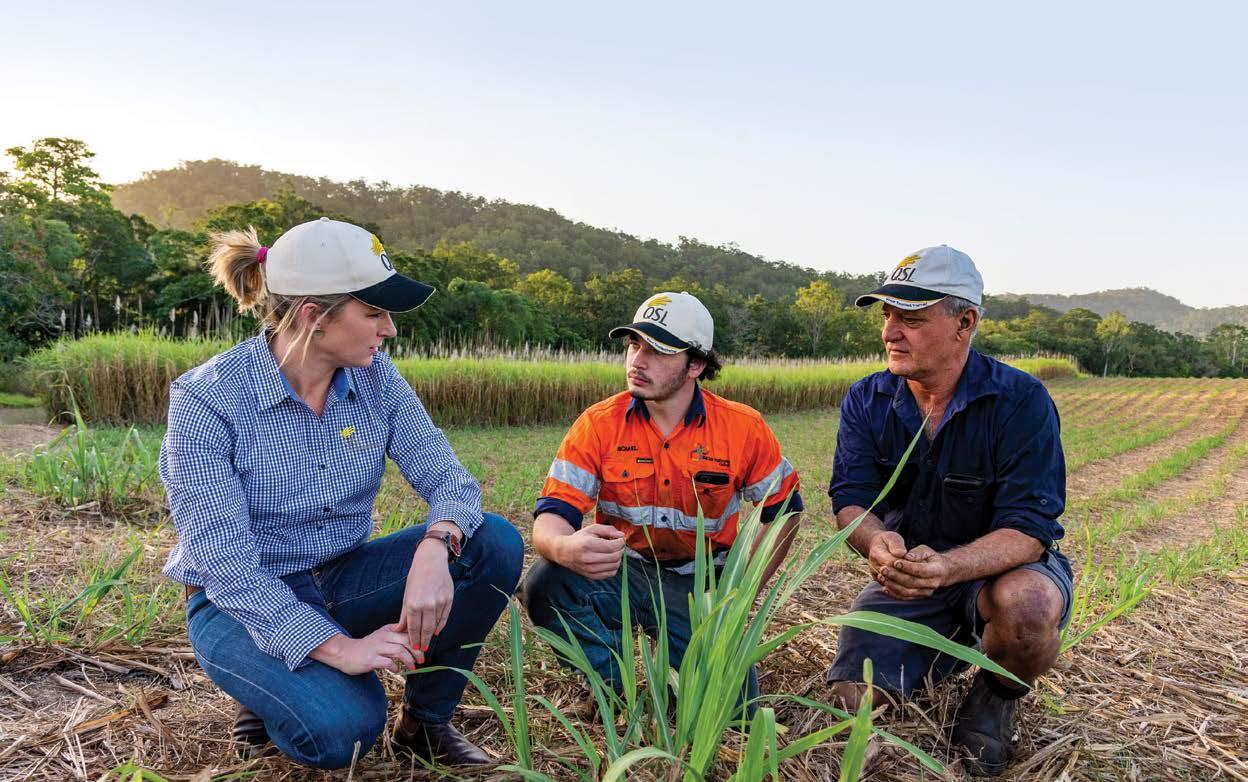
NEW & IMPROVED: 2021 SEASON
More pricing opportunities
• Commitment limits increased to 70% Don’t miss your • Price up to 98% yourself in the Self-Managed Harvest Contract chance to use More flexible grower-managed pricing QSL in 2021 Marketing • Choose if and when you want to roll in the Individual Futures Contract nominations close • Simplified Self-Managed Harvest Contract with new rolling option 31 OCTOBER
More ways to price it yourself
• New Grower Floor Contract lets you lock in a minimum return with potential for higher returns if the market rises • New Defaulting Target Contract lets you set a pricing target but default to the Harvest Pool if it doesn’t fill before the season starts
FOR MORE INFORMATION, CONTACT YOUR LOCAL QSL TEAM Far North Queensland Proserpine Mackay Daniel Messina Amanda Sheppard Karen Vloedmans Harriet McLennan Sonia Ball
0429 660 238 0418 264 393 0429 804 876 0409 830 554 0418 978 120
Burdekin Herbert River Russell Campbell Kristen Paterson Kylie Burkett James Formosa Michelle La Rosa-Aili
0408 248 385 0438 470 235 0428 664 057 0447 062 213 0408 800 937
Plane Creek Kathy Zanco
0437 645 342
Southern Queensland Cathy Kelly
0409 285 074
TEACHING NEW DOGS OLD TRICKS
The winds of change have been blowing hard and fast through the agricultural and natural resource sectors in recent years, leaving many farmers feeling besieged. Another group that has taken a pummelling is extension officers, the ones who are often the meat in the sandwich between the farming community and regulatory bodies.
BY CINDY BENJAMIN
In 2017, the Great Barrier Reef Water Science Taskforce found that the extension system in Queensland was ‘fragmented’, with ‘high turnover in government funded programs and a lack of some expertise and capacity in key areas’.
In response to this, 110 extension officers at the 2019 Reef Think Tank identified the urgent need to create a defined extension model to bring consistency of practice and more reliable results. The State Government’s enhanced extension coordination project within the Queensland Reef Water Quality Program subsequently funded the codevelopment of a shared, cross-industry extension model of practice to guide the design and delivery of future extension programs.
CANEGROWERS Isis manager Angela Williams is the driving force behind the development of the extension model, which she says focuses on the foundational relationship between
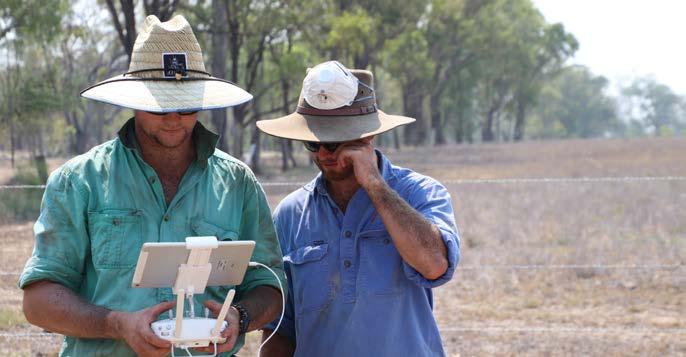
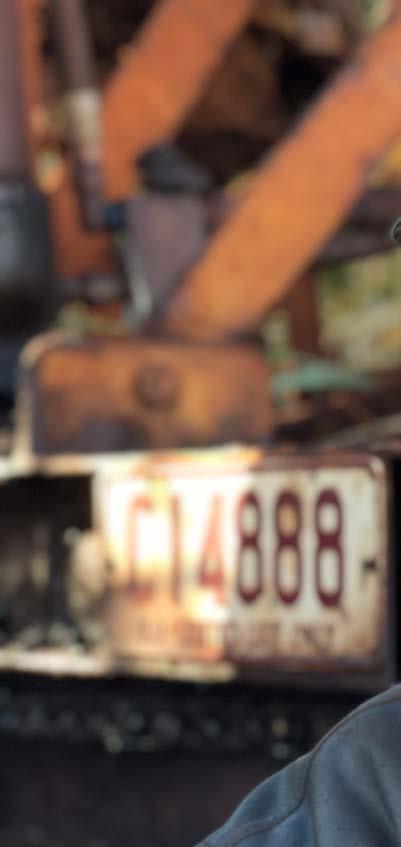
Pictured: Extension officers bring technical knowledge and help farmers consider the options available to them.
Pictured: A farmer-centred extension model has been built for the purpose of helping extension officers to confidently deliver a consistent service to cane growers like Angelo LaRocca and the wider rural sector.
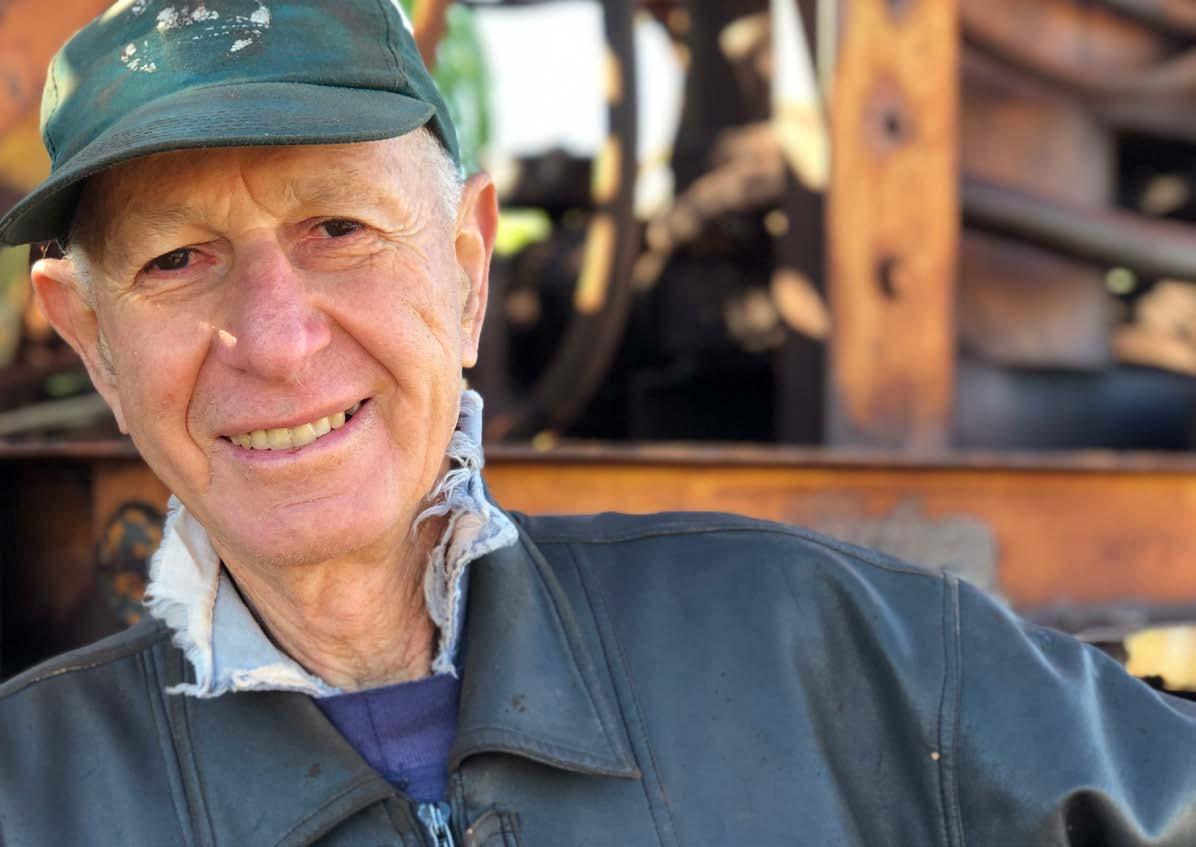
extension officers and farmers essential for enabling extension practice to meet Queensland’s current ‘change challenge’.
“The model hones in on the fact that what we do in extension is important, but how we do it makes the difference,” Angela says.
“It acknowledges that significant change is often difficult and requires the consistent use of a farmercentred process where the extension officer builds relationships, provides technical know-how and supports the implementation of change on farms.”
“Extension officers currently juggle the demands of technical knowledge in agricultural and environmental science with social consciousness, sociology, social work and project delivery,” she says.
“This is an interesting and challenging interface, but without any formal roadmap or guide for how to do their work, many extension officers feel that it is very difficult to effect real change and meet the targets set out in the often short term projects that fund their work.” The project team – Angela Williams and Joanne Hall from CANEGROWERS Isis, and Paul Prichard and Deb Sestak from Murdoch Children’s Research Institute (MCRI) – collected over 400 pieces of ‘evidence’ from farmers, researchers and extension officers to co-develop an extension model that will underpin current and future extension efforts.
This work effectively answered the question: ‘What makes a good extension officer and what are the magic ingredients?’
The resulting model puts the farmer squarely in the centre of the dynamic with the extension officer providing an enabling role to effect change that the farmer wants to make.
The interaction follows a step-by-step process to establish a solid working relationship that then enables the farmer to access the technical knowledge and skills required to make changes in their operation that achieve productivity, profitability and sustainability outcomes on-farm, as well as off-farm environmental outcomes such as good quality water entering the Great Barrier Reef lagoon. Continues next page
Pictured: It takes time and skill to develop a productive working relationship. Veteran Isis Productivity Services extension officer Andrew Jenkins chats with grower Peter McLennan on his Farnsfield farm.
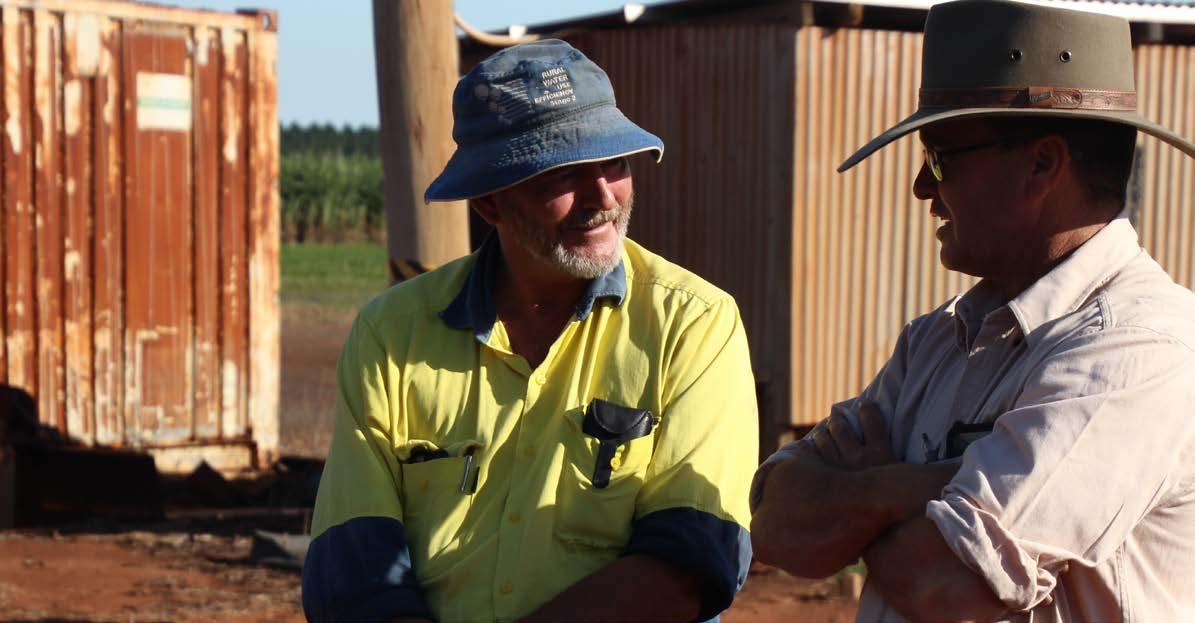
For the extension officer, the model seeks to enhance their efficacy and credibility as agents of change, and ultimately winning the ‘change challenge’.
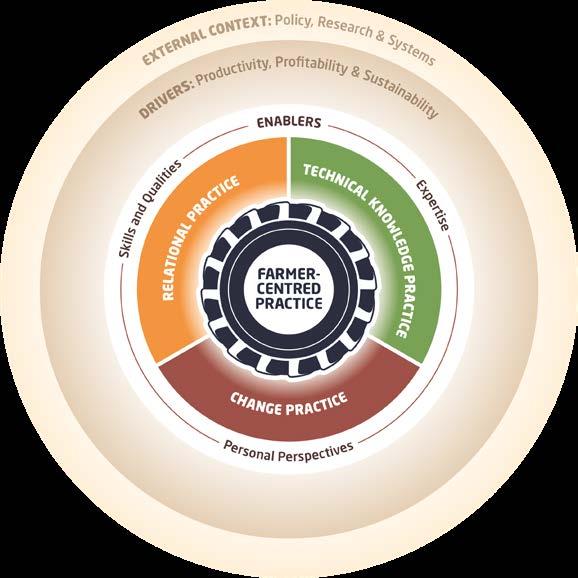
Once the relationship has developed the grower and extension officer can work together to solve problems and implement change. Angela says the development of the model involved asking the big questions, such as:
Why do some farmers adopt new practices while others do not? Why do some extension officers have better, more effective relationships and achieve more with the farmers they work with? What training do early career extension officers need to assist them to build effective relationships with farmers?
How does the policy and structural environment affect the relationship between extension officers and farmers, and the achievement of mutual outcomes?
“The delivery of this Extension Model of Practice is really an important beginning, not an end point,” says Angela. “The next step is to embed the model into the training, policy and funding framework to enable extension officers to work more effectively. “We know from other sectors that people change in relationship with others
Pictured: Innisfail Smartcane BMP facilitator Deb Telford chats with local accredited grower Joe Zappala.
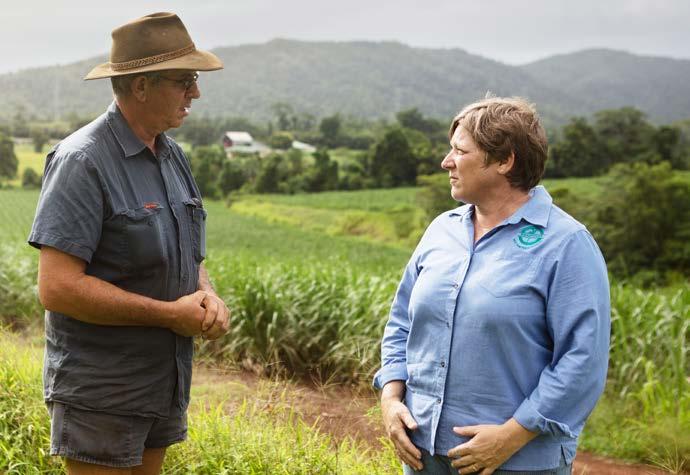
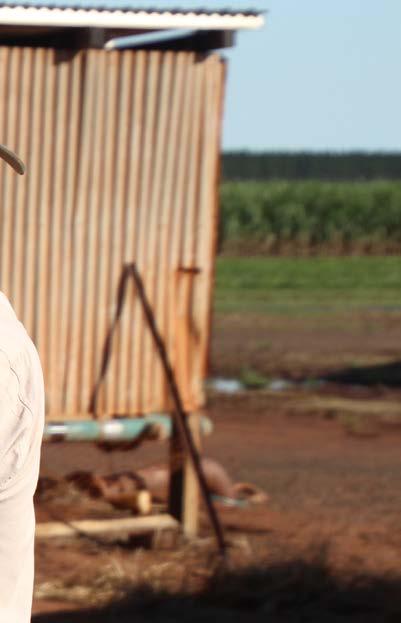
when there is a consistent model of practice that values and ‘listens to’ the person responsible for implementing the change.” Although this model is new, it has been distilled from the experience of extension professionals who are effective largely because they possess or learned many of the key qualities, and innately use the methods required for farmer-centred extension.
“The model will add to the rich fabric of rural extension theory and principles, providing guidance for current, and a legacy for future, practitioners. Angela emphasises that “the skills and personal attributes required can and must be taught to all who seek to work in advisory, extension or helping roles in the essential and fulfilling field of agriculture and land management and to be an integral part of real and long-lasting change.”

IN THE DEEP END
Imagine the thrill that a young, enthusiastic and well-educated person would feel when they land a great job working on a project where they will be an agent for positive change. Then imagine the anxiety that would set in when they discover their training has not prepared them for a central component of the job, and that there is little time or opportunity to learn the required skills on the job. One such extension officer, Simon Hunt, has been working on his project in the grazing industry for 18 months and says he’s loving the challenge but there are many things about the job that have been intimidating.
“I’m from a small country town in Far North Queensland and although I’ve worked on cattle properties as a ringer, I really didn’t know how to present ideas to a manager or quickly respond to different opinions or values landholders might have,” he says. “Even little things like how to make those critical first connections of looking producers in the eye and shaking their hand properly.” In contrast, Deb Telford is a seasoned extension officer currently working as the Innisfail Smartcane BMP facilitator, who recognises that she had much greater support and mentoring when she started her career. “This new model documents the way I was taught to do my job,” she says. “In my early years in extension I was able to spend time learning from experienced practitioners. “These days people are employed directly into projects with specific targets, with little opportunity to learn or develop relationships. It’s not their fault, they just don’t know how to go about it.” Deb says many growers are frustrated by the current situation and this can become another barrier to the adoption of practices that are beneficial to the profitability, productivity or sustainability of their businesses.









